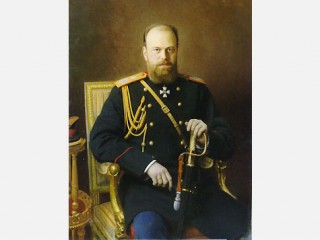
Alexander III biography
Date of birth : 1845-02-26
Date of death : 1894-10-20
Birthplace : St. Petersburg, Russia
Nationality : Russian
Category : Historian personalities
Last modified : 2010-11-19
Credited as : Emperor of Russia, son of Alexander II of Russia, known as czar peacemaker
Alexander III was emperor of Russia from 1881 to 1894. During his autocratic reign Russian absolutism asserted itself for the last time.
Alexander was born on Feb. 26, 1845. His father, Alexander II, appointed the historian K. P. Pobedonostsev to tutor the heir apparent in Russian history and law in 1861. Alexander's mind and character were largely molded by Pobedonostsev, who instilled ardently nationalistic views in his young pupil. As heir apparent, Alexander took part in the administration of the state. During the war with Turkey in 1877-1878 he held a military command.
Alexander married Princess Sophie Frederica Dagmar of Denmark (known in Russia as Maria Fedorovna) and was a devoted husband and the father of five children. He preferred country life at Gatchina to the pomp of the St. Petersburg court.
Alexander's autocratic opinions were profoundly influenced by Pobedonostsev, who became director general of the Holy Synod of the Russian Orthodox Church in 1880, and by the journalist M. N. Katkov. Alexander followed Pobedonostsev's advice in making political decisions and in appointing personnel to higher offices. Katkov's influence was exercised through his articles in the reactionary Moscow News, which Alexander read regularly.
Alexander issued an imperial manifesto on April 29, 1881, which ended the constitutional reforms of his father and proclaimed the absolute power of the emperor. The law of Aug. 14, 1881, empowered the government to declare a state of emergency in any part of the realm; administrative officials in the areas under the emergency regime were vested with broad extrajudicial and executive powers: arrest, imposition of fines, and confiscation of property without trial; transfer of cases from criminal court jurisdiction to that of military tribunals; the closing of schools; the suspension of periodicals; and the removal of officials. Enacted as a provisional measure for 3 years, the law was renewed and operated until the Revolution of 1917. The law of July 12, 1889, retained the township as a peasant institution but subjected it to the control of a new official, the land captain, who was empowered to suspend or remove elective peasant officials, arrest and fine peasant officials without a trial, and veto decisions of township and village assemblies.
The act of 1890 introduced significant restrictions in the organization of the provincial assemblies. The electors who chose the members of the assemblies were segregated in three electoral colleges on a class basis: nobles, all other electors except peasants, and peasants. Women were denied direct vote but could exercise their electoral rights through male representatives. Jews were totally disfranchised. The act of 1892 limited the right to vote in municipal elections to owners of real estate of a specified value and to proprietors of important commercial and industrial enterprises.
The law of Dec. 28, 1881, made it compulsory for serfs to redeem their land allotments, although the payments were lowered. Measures were taken to promote the expansion of peasant landholding areas, and a bank was founded to assist peasants in buying land. But under the passport law of June 1894, peasant were still denied a passport—that is, the right to seek employment outside the village—without the consent of the village assembly.
The government strove to prevent depreciation of the paper ruble and to link it eventually to precious metal by building up the gold reserve. Beginning in 1880, the government took an active part in building and administering the railways, and by 1894 it had taken over 24 lines.
Alexander III is known as the "czar peacemaker" because under his rule the empire remained at peace except for minor, although costly, military expeditions in central Asia. Relations with England were greatly improved, and France replaced Germany as Russia's ally. He died on Oct. 20, 1894.
Hugh Seton-Watson, The Decline of Imperial Russia 1855-1914 (1952), thorough and well balanced, surveys both internal and foreign policies. Michael T. Florinsky, Russia: A History and an Interpretation, vol. 2 (1953), is the most complete narrative of prerevolutionary Russian history in English and is particularly strong on the 19th and early 20th centuries.
















